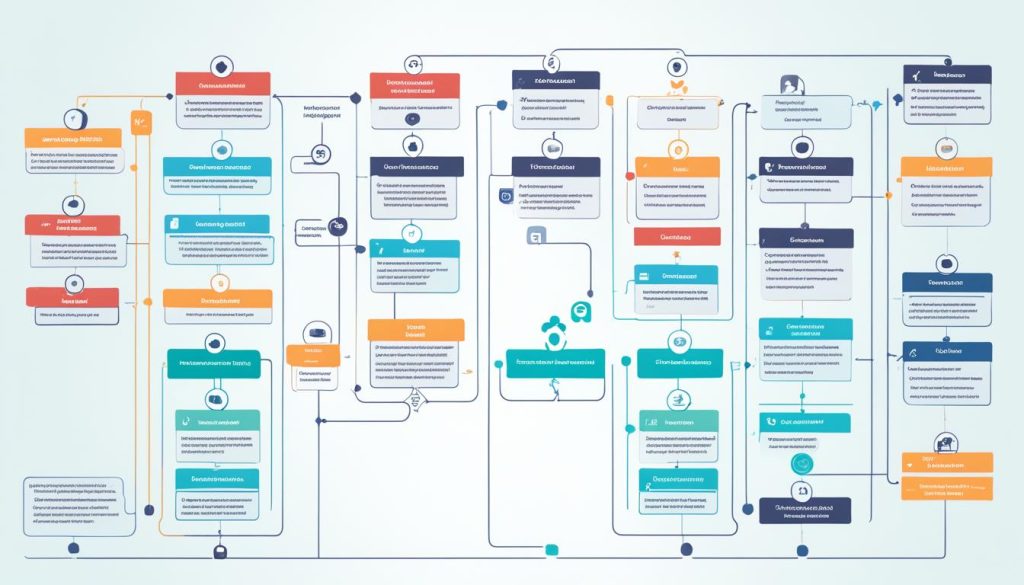The societal pulse of the 21st century beats within the various social platforms that comprise the digital landscape of our lives. Originally born from a need to connect, social media’s tentacles have now penetrated the core of modern businesses, transforming into a powerful marketing tool, and a reflection of the digital consumer lifestyle. As such, understanding the social media impact on business has become tantamount to embracing success in an era driven by digital technology.
Indeed, the seismic shift brought about by platforms like Facebook, Twitter, Instagram, and TikTok has not only democratized the distribution of information but has also incited significant social and political movements. This cultural metamorphosis has necessitated an evolution of social media strategies amongst businesses, carving out a role that is imperative to consumer engagement, brand perception, and the growth trajectory of companies worldwide.
Key Takeaways
- The indispensable role of social media as a marketing tool in today’s digital consumer climate.
- The transition from a platform for connection to a driver of cultural and business innovation.
- Strategies for businesses to navigate and capitalize on the digital technology landscape.
- The importance of adapting to the rapid transformations in social media to sustain business growth.
- The significance of active engagement on social media platforms for optimal brand perception and advocacy.
The Transformation of Business Engagement through Social Media
Embarking on the journey from simplistic online interaction to a comprehensive social media business growth strategy depicts the monumental shift that the digital world has witnessed. With each tweet, post, and share, social media marketing cements itself as a linchpin for customer engagement. It’s within this realm that companies now thrive by making personal connections with their audience, thereby branding themselves not simply as entities but as digital marketing powerhouses.
The Evolution from Direct Communication to Digital Marketing Powerhouse
Initially, systems like the Primitive CTSS represented the inception of digital dialogues, carving a path for the bulletin board systems (BBS) to enable more complex interactions through textual conversation and file exchange. Then, the landscape further morphed as services such as CompuServe and Prodigy delivered online forums and real-time chats. But it was AOL’s instant messaging technology that truly redefined how users connect in cyberspace. Websites like Classmates.com and SixDegrees.com further shaped our modern understanding of social networks. As these platforms evolved, they became tools for cultivating a strong backbone for business presence and engagement in the online world.
How Social Media Cultivates Business-Customer Relationships
The foundation of a business’s online identity is now deeply intertwined with customer connections. Through direct interaction on various social media platforms, businesses pave the way for coalescing product development precisely with user preferences. This paves the way for improved customer service and loyalty, as well as a treasure trove of consumer insights. Such interactions are central to developing and expanding the reach of a business, granting it an unwavering brand voice amidst a digital marketing powerhouse.
Impact of Social Media on Business Growth and Brand Building
At the heart of the digital age, social media engagement has become a catalyst for brand building and eCommerce success. As avenues for direct online connectivity continuously evolve, businesses experience unparalleled growth through tightly-knit feedback loops that connect them with global audiences.
Platforms renowned for networking not only facilitate introductions but also bind communities with shared values and interests. This, in turn, cultivates a sense of brand affinity and loyalty that is nearly impossible to forge through traditional marketing alone.

Social media management is at the forefront of this transformative process. It allows businesses to gain valuable insights and stimulate consumer demand. By optimizing social media strategies, companies can offer tailored products, streamline project management, and nurture a knowledgeable workforce.
From LinkedIn’s career-building platforms to Instagram’s brand-storytelling prowess, social media has extended far beyond simple communication—reshaping politics, commerce, and public discourse.
However, the giant strides in connectivity and engagement come with their set of challenges. The prevalence of ‘slacktivism’—where engagement does not always translate into action—and potential adverse effects like cyberbullying pose significant threats. These underscore the critical need for discerning and ethical social media management strategies.
- Enhanced customer support via social platforms.
- Focused brand awareness campaigns targeted at specific social groups.
- Robust community management to foster a loyal customer base.
Thereby, in the realm of social media, every like, share, and comment serves not just as a metric of popularity but as the pulse of a brand’s online presence and influence, propelling both storied and emerging brands into the future of digital commerce and community-building.
Integrating Social Media Strategies for Competitive Advantage
The business landscape is continually evolving, and social media channels have established themselves as key players in determining the success and growth of a brand. By integrating well-crafted social media strategies into their core marketing efforts, businesses can achieve a significant competitive advantage. This can be achieved by crafting a social media marketing plan that is responsive, dynamic, and aligned with a company’s overarching goals. The following content provides a deep dive into creating a robust social media marketing plan and demonstrates how the use of analytics can measure and define success in this digital realm.
Developing a Cohesive Social Media Marketing Plan
To navigate the intricate web of social interactions and translate them into business success, a cohesive social media marketing plan is essential. This plan should not only outline the types of content to be shared but also include the platforms that are best suited for reaching the target audience. Additionally, it should encompass scheduled postings, budgets for sponsored content, and a monitoring system to gauge the reception of the material circulated.

Achieving a competitive edge through social media involves a deep understanding of the metrics behind user interactions. These include:
- Source of traffic and lead generation
- Engagement rates, including likes, comments, and shares
- Audience growth over time
- Conversion rates and related RoI calculations
Measuring Success with Social Media Analytics
Social media analytics are critical for businesses aiming to quantify the impact of their social media engagements. By monitoring various metrics, companies can refine their strategies in real-time, ensuring that their campaigns are effective in fostering growth and customer retention. Essential to this process is the ability to track, analyze, and interpret the data collected through various social platforms.
| Objective | Metric | Tool | Insight |
|---|---|---|---|
| User Engagement | Comments, shares, likes | Facebook Insights | Gauge content resonance |
| Traffic Generation | Click-through rates | Google Analytics | Assess campaign effectiveness |
| Brand Perception | Sentiment analysis | Brandwatch | Understand customer feelings |
| Conversion Monitoring | Conversion rates | Instagram Analytics | Translate engagement into sales |
In conclusion, organizations that leverage social media analytics to assess the efficacy of their marketing efforts are positioned to make informed decisions that will drive business growth. By harnessing this data, businesses can optimize their social media presence, fostering meaningful connections with their audience, and ultimately, securing that all-important competitive advantage in the market.
Innovative Social Media Advertising and its Influence on Sales
In the arena of modern commerce, social media advertising has burgeoned into a quintessential instrument for shaping consumer desires and galvanizing purchase decisions. With precision targeting and creative gusto, businesses can launch campaigns that not only garnish significant attention but also resonate profoundly with their intended demographics. This specificity in reach equates to crafting a narrative that coalesces seamlessly with the needs and wants of potential customers—thereby amplifying sales influence and fostering a narrative of brand success. As the digital ecosystem thrives on interaction, the virality of content becomes a lever for pushing sales figures upward, melding consumer interest with irresistible call-to-actions that drive revenue.
Another critical element at play is the concept of business credibility. The interplay between visibility and trust is delicate; a robust presence with active engagement can project strength and reliability, consequently enhancing a brand’s stature in the crowded marketplace. However, not all engagement guarantees favorable outcomes. The number of shares or likes—an embodiment of social proof—can serve as a barometer for public endorsement. Noteworthy is the revelation that oversharing or flooding channels with content does not necessarily equate to positive consumer perception. Intriguingly, instances have surfaced where the reduction of social share indicia fosters a more streamlined path to purchase, sidestepping the potential stigma of low engagement numbers.
Upon delving into the intricacies of social media’s influence on sales, it becomes evident that while its prowess is undeniable, the wielding of this double-edged sword demands a nuanced approach. The goal is not merely to raise numbers of likes and shares but to cultivate an authentic relationship with consumers. In doing so, businesses navigate toward a harmony of sales influence wedded with integrity and trust—cornerstones of a brand’s long-term esteem and prosperity. As such, the success of social media campaigns in propelling sales hinges upon an astute balance—leveraging analytics and engagement to guide strategy all the while preserving the genuineness that consumers invariably gravitate towards.
FAQ
Social media has had a transformative impact on businesses by providing them with a dynamic digital technology platform to enhance their marketing tool arsenal. It shapes the digital consumer lifestyle and forms an integral part of effective social media strategies, allowing brands to reach and engage audiences at an unprecedented scale.
Social media fosters personal connections and facilitates direct communication with consumers, evolving into a digital marketing powerhouse. It has redefined customer engagement, enabling businesses to respond to customer inquiries, gather feedback, and personalize their marketing messages in real-time.
Absolutely. Social media engagement is critical for brand building and can significantly influence business growth. Platforms like Facebook and Instagram can be integral parts of an eCommerce strategy, helping businesses to extend their reach, engage with more potential customers, and strengthen their brand presence online.
Developing a social media marketing plan involves setting clear objectives, understanding the target audience, crafting compelling content, choosing the right platforms, and scheduling posts for optimal engagement. It requires a synergy of creative and analytical approaches to align with a brand’s overarching marketing strategies.
Social media analytics offer insights into user behavior, campaign performance, and engagement metrics, which are invaluable for refining marketing strategies. By understanding these analytics, businesses can make data-driven decisions to increase ROI, enhance content relevance, and ultimately gain a competitive advantage in the marketplace.
Social media advertising plays a crucial role in influencing sales by targeting specific demographics with personalized ads. It can increase brand awareness, boost web traffic, and lead to direct conversions. However, advertisers must be mindful of their audience and strive to maintain business credibility and avoid negative social proof to achieve the best results.







